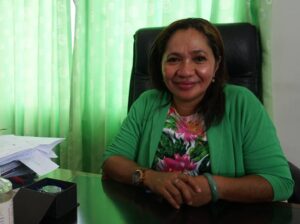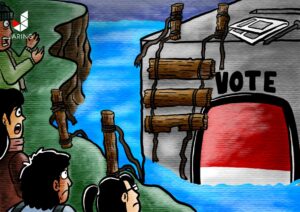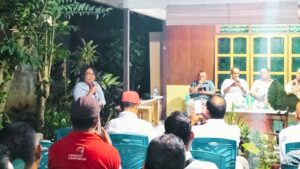Several countries which previously postponed conducting their elections cycle have currently announced that they are ready to conduct the voting process. What is their primary rationale of conducting the elections amid the COVID-19 pandemic?
“Without the elections there will be no parliamentary members, no political parties and no laws which can be drafted to protect human rights,” said Manjula Gajayanake, the coordinator of Center for Monitoring Election Violence, an elections civil organization watchdog based in Sri Lanka.
Through an online discussion conducted in late June 2020, Manjula conveyed her views on the negative consequences which might happen if the country’s government and general elections commission kept on postponing its 2020 legislative elections.
Currently, according to Manjula, no watchdog has been able to hold the government’s executive office accountable since the Sri Lankan President Gotabaya Rajapaksa dissolved the parliament on March 2, 2020. The fact that the country’s general elections, which was supposed to be held on April 25, 2020, were postponed because of the COVID-19 pandemic.
The Sri Lanka general elections commission chairman Mahinda Deshapriya said that he did not mean to pose an obstacle to the democratic process. The country’s health ministry did not approve of the commission’s initial plan to conduct the elections on June 20, 2020, after the commission had postponed the process for two months.
Besides that, Sri Lanka also had no other choice but to postpone the elections further because it had been implementing a nationwide regional quarantine since March 2020 right up to June 2020 to curb the spread of the coronavirus. The above policy, according to Deshapriya, significantly restricted the movements of voters to effectively participate in the elections.
“We have talked to the government and the healthcare sector, the COVID-19 handling task force, the national disaster mitigation agency as well as the police to consult with them on how to conduct the elections amid the pandemic situation. We have already come up with a guidebook outlining the recommendations of the healthcare sector on how to conduct the elections amid the pandemic,” Mahinda said during a discussion themed 2020 Sri Lankan Parliamentary Election: A Situation Update conducted online on Saturday, June 27, 2020.
Upon rescheduling the elections twice, Sri Lanka eventually decides to conduct the parliamentary elections on Aug. 5, 2020. As many as 1.2 million individuals will enjoy their rights to vote for parliamentary members who will occupy the House of Representatives’ 196 seats. Sri Lanka has allocated Rp 518 billion (US$37 million) additional funds to fulfill health and hygiene protocols.
“Money is not the real problem; the more urgent problem here is how to save democracy,” he said.
No different from Sri Lanka, Indonesia also plans to move ahead with its simultaneous regional head elections across the country’s 270 regions amid the pandemic, after having postponed it indefinitely. Indonesian General Elections Commission (KPU) chairman Arief Budiman said that he had already proposed three voting dates: Dec. 9, 2020; March 17, 2021 and Sept. 29, 2021.
Out of all the dates proposed, the government has decided to conduct the simultaneous regional elections on Dec. 9, 2020 albeit still cannot tell for sure when the coronavirus pandemic will be over.
“Not even one expert can tell for sure when the pandemic will be over; amid all this uncertainty, it [the government] has decided to conduct the votes in December while adapting to new habits,” Arief said in July 2020.
Arief added that the regional elections would adopt all the health and hygiene protection protocols recommended during the COVID-19 pandemic. The government has also approved the proposed additional budget of up to Rp 4.7 trillion (US$335.7) to be able to comply with the new healthcare procedures. The government, however, can only disburse the budget gradually.
Clear decisions about general elections
The Philippines-based National Citizens Movement for Free Elections Executive Director Damaso G. Magbual said that countries could still organize the general elections amid the COVID-19 pandemic without exacerbating the health crisis. Damaso used South Korea, which conducted its parliamentary election in April 2020, as an example.
“We can use South Korea as good example on how to conduct the general elections amid the pandemic. Many countries have sacrified their democracies because of the pandemic, yet many experts have applauded South Korea for conducting the elections perfectly; I agree with these experts on this,” Magbual said during a discussion called Implementing Elections During a Pandemic on Friday, June 12, 2020.
Magbual also emphasized that amid the pandemic, the countries have to make meticulously detailed preparation on contamination prevention and transmission mitigation in order to turn elections into success amid COVID-19.
Yet, he does not deny possibilities that the economic and technological gaps among Asian countries play roles in hampering the elections amid COVID-19. Each country, according to Magbual, has to make sure it has adequate technology infrastructure, alternative voting mechanisms and, of course, sufficient budget to provide these things so that they can equal South Korea’s general elections success amid the pandemic.
Even if these countries eventually decided to postpone their elections, these countries still needed to fulfill several requirements to do it, such as securing the approval of political parties which backed the elections and informing the public properly on why they eventually came to that decision.
Not only that, the former philosophy and political sciences professor in the St. Louis Philippines University also said that these countries needed to have a strong legal basis in which they postponed the elections: the problem was, he said, none of the Asian countries had comprehensive laws regulating voting postponements under pandemic situations.
Furthermore, Magbual also said that postponing the elections alone was not enough; governments also needed to assign a definitive new date for the elections.
“Without any certainties when the postponed election will be conducted, the government will sacrifice democracy,” Magbual said.
Magbual pointed to data provided by the International Institute for Democracy and Electoral Assistance (International IDEA) which revealed that the coronavirus pandemic had caused at least 10 Asian countries to postpone its general elections. These countries are: Bangladesh, India, Indonesia, Iran, Maldives, Kyrgyzstan, Oman, Pakistan, Sri Lanka and Syria. Five among them have already assigned a definitive new date for the election, while five others were yet to decide on a new date for the elections.
Stop postponing the elections
Since the COVID-19 pandemic started to erupt in South Korea in early February 2020, the country’s infection rate reached 10,661 cases in April 2020. Regardless, the country moved ahead 2020 Legislative Elections agenda in April 15, 2020.
The Korean Democratic Foundation international civil society network division Kim Chan-ho said that the South Korea government and civil society alike had never discussed postponing the general elections. Most of the time, Chan-ho, said, they were discussing about safe general elections procedures instead.
“South Korea has never in its entire history postponed the general elections. Even when the World War happened, South Korea moved ahead with its plans to conduct the elections,” Chan-ho told Jaring.id on Wednesday, July 29, 2020.
According to Chan-ho, South Korea also does not have any strong arguments on its part to restrict people’s movements as has been done by various countries around the globe. The South Korean government, for example, has so far only called on its people to observe physical distancing while advising them to remain at home for the longest time.
The Asian Democratic Network Program Manager Soon Yoon-suh said that South Korea considered postponing the elections as a taboo subject. Despite that, several candidates did propose postponing the elections, citing time constraints as a primary reason. Yet, their proposal has never been seriously mulled in official fora.
“We have a history of leaders usurping power by attempting to change the national constitution and postpone the elections. Various democratic movements have opposed the attempt. This is why attempts to postpone the elections have always been seen as problematic here,” he said on Friday, June 26, 2020.
The general elections in South Korea amid the COVID-19 has been under the spotlight: during the elections conducted in April 2020, South Korea recorded the highest voter turnout in 28 years of 66.2 percent, following the 71.9 percent turnout in its 1992 elections. This increase, according to Yoon-suh, is thanks to the government’s decision to lower the voter age threshold to 18 years from the previous 19-year-old minimum age.
“Yet I also believe that people have increased their participation in the elections because they have also been impressed by the government’s swift response to the pandemic, which has inspired people to cast their vote during the elections,” said Yoon-suh.







